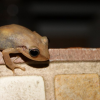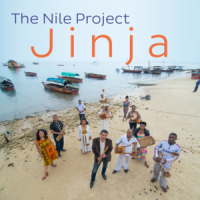Home » Jazz Articles » Album Review » The Nile Project: Jinja
The Nile Project: Jinja
The celebrations began in the host country of Rwanda, with "Inganji," where native singer Sophie Nzayisenga is joined by Selamnesh Zemene from Ethiopia in a friendly banter, approved by a raucous chorus. "Allah Baqy" is an ancient love song performed in traditional form by Egyptian Dina El Wedidi, with added Sudanese lyrics by Sarah Abunama-Elgadi. The Ethiopian current continues with "Ya Abai Wuha," while "Omwiga," highlights indigenous Ugandan stringed instruments introducing ancestral drumming provided by the other ensemble members. The distinctive African percussion continues on the Burundian "Uruzi Nil," featuring bassist Steven Sogo on vocals as well. The mood is tempered on the recognizable Egyptian "Dil Mahbuby" as Mohamed Abozeky displays his technical prowess on the oud, with an encore by singer El Wedidi.
Since jazz has its origins in Africa, it's no surprise that the saxophone offered by Jorge Mesfin on "Tenseo," has shades of what many of the American players have been trying to achieve with sonic and tonal experimentation. Based on an Egyptian Orthodox hymn, his interplay with Abozeky's oud is masterful and cerebral, as they unite in melodic fusion while improvising along exotic scales. Bassist Sogo returns on "Biwelewele," a tribute to his homeland of Burundi, accompanied by all the singers joining in as a responding choir. The countries of Uganda, Burundi and Rwanda, who all share the Nile River, are highlighted on "Mulungi Munange," in a closing finale to a fascinating record.
While it might seem that there is a lot going on (and there is) the music flows along much like the river which it is emulating. This mighty river is not only a valuable navigation and water source, it serves as a transmission line for the cultures that inter-connect along its expansive historical banks. The Nile Project cleverly blends six languages and dialects with poly-rhythmic tempos and modes, into what they hope will be "the Nile sound." They have succeeded.
Track Listing
Inganji; Allah Baqy; Ya Abai Wuha; Omwiga; Uruzi Nil; Dil Mahbuby; Tenseo; Marigarita; Biwelewele; Mulungi Munange.
Personnel
Dawit Seyoum: krar, bass krar; Dina El Wedidi: doof, table, riqq; Jorga Mesfin: saxophone; Kasiva Mutua: ohangle, djembe; Meklit Hadero: vocals; Michael Bazibu: adungu, entongoli, Uganda drums, engalabi; Mohamed Abozekry: oud, Nader Elshaer: qawala; Sarah Abunama: vocals; Selamesh Zemene: vocals; Sophie Nzayisenga: vocals, enenga; Steven Sogo: vocals, bass, ikembe.
Album information
Title: Jinja | Year Released: 2017 | Record Label: Self Produced
< Previous
Rejoice! I'm Dead!
Next >
Kansas City Here I Come
Comments
Tags
For the Love of Jazz
 All About Jazz has been a pillar of jazz since 1995, championing it as an art form and, more importantly, supporting the musicians who create it. Our enduring commitment has made "AAJ" one of the most culturally important websites of its kind, read by hundreds of thousands of fans, musicians and industry figures every month.
All About Jazz has been a pillar of jazz since 1995, championing it as an art form and, more importantly, supporting the musicians who create it. Our enduring commitment has made "AAJ" one of the most culturally important websites of its kind, read by hundreds of thousands of fans, musicians and industry figures every month.



















